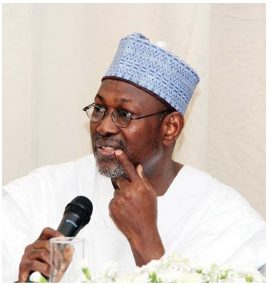2023 Polls: Jega Spells Out Requirements for Electoral Integrity

By Prosper Okoye
As Nigerians await to elect their political representatives come next year’s general polls, Professor Attahiru Jega identifies electoral security as a prerequisite condition for achieving intergrity elections; which is critical in catalysing democratic development, predicted on good governance.
In the words of Jega: As we look forward to 2023 general elections, there is increasing apprehension that the all-pervasive insecurity situation in the country may present a formidable obstacle if not obstruction.
Unless elections are prepared and conducted in an environment that is peaceful and secure, its integrity and even the legitimacy of the outcome would be in question.
While making a presentation on the theme ; ‘Election Security and Good Governance in Nigeria’ at the University of Ibadan, He informed, that to ensure the integrity of elections, qualified citizens should have no fear of registering to vote, and therefore come out to register; registered voters should be given the confidence to turn out to vote without fear of threats, intimidation, violence, and terrorist attacks; Election officials should feel safe and secure to discharge their official duties; Election materials should be secured; and Election results compilation, collation, transmission, and announcement should be free from interference.
The former INEC chairman recounts that the country has been in the transition to democracy for the past 21years; had held 6 elections up till date, of which the 2007 election that brought in Late President Yar Adua was “widely acclaimed as a disaster and dubbed with the appellation of being the worst in Nigeria electoral history, largely and essentially on the account of failure to recognize and pay attention to the need for consistent upscaling of electoral intergrity and election security.”
Although President Jonathan administration adopted some of the recommendation made by Justice Muhammadu Uwais Electoral Reform Committee, election integrity has continue to deteriorate as a result of, the partisan appointments and executive lawlessness which has eroded the Independence of the Independent Electoral Commission (INEC). Inadequate professional training and motivation for electoral staff; lack of credible voters register; political party sabotaging activities; elected politicians/ “militicians” who occupy elective position in the governance sphere, mostly, for selfish and parochial objectives, with a predilection to raid public treasury; and INEC inadequate preparedness for elections.
On the issue of good governance, he advocates for “Good Democratic Governance” _ which is a fundamentally inclusive and participatory form of governance in which citizens, as sovereigns are truly masters of their own destiny in determining who governs them, how they are governed and how governance addresses their fundamental needs and aspirations.
Prof. Jege observed that the lack of “Good Democratic Governance” is the reason for the nation’s further socio-economic decline. Nigeria’s current rating, using comparative global indices, tell a sorry tale. Incidence of poverty has increased and is now very high, that she has assumed the unenviable position of being named as the “poverty capital of the world”; Nigeria rating of Human Development Index (HDI) is very low, (158/189, 0.534%) indicating lack of capacity to promote development and ensure security for citizens; Governance rating is low (53%) and Quality of Democracy is equally low (4.10%).
“It is an unwholesome image which leaves much to be desired and which calls for urgent attention for reforms and repositioning, if Nigerian is to attain its potential of being a global competitive member of the comity of Nations.”
In this regard, he continues, the following measures, actions and strategies need to be taken. First, all our security agencies and forces have to play necessary roles during elections.
“In a country with acute systematic challenges like ours, the question is not whether a particular armed force should be involved in elections or not, but rather, how they should be involved.”
Secondly, the role INEC Inter-Agency Consultative Committee on Election Security (ICCES) has to be reviewed and reformed;
Thirdly, Increasing use of appropriate and effective cyber security tools to enhance electoral security;
Fourtly, Deployment of the Election Risk management Tool, developed by I – IDEA, which enables Inec to scientifically and more appropriately analyze and asses risk factors, and collaborate with security agencies to mitigate them;
Fifthly, Introduce programmes to help reduce inter- service rivalry, and promote INEC and security agencies collaboration;
Last but not the least, Population of security agents should be increased through recruitment.
He concluded by beckoning on “patriotic Nigerians who believe and cherish the idea of one united Nigeria, premised on unity in diversity”, to increase struggles within democratic means, to halt the decay, reverse the dangerous course, reposition the country, improve intergrity of elections, empower citizens to actively participate and ensure better recruitment of elected representative and generally nurture the desirable environment for good democratic governance.



